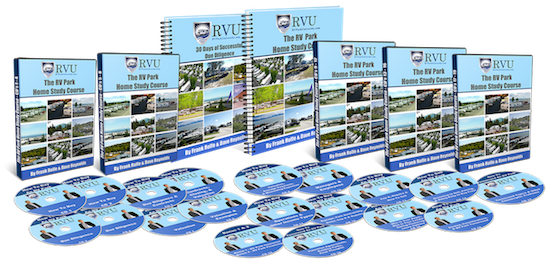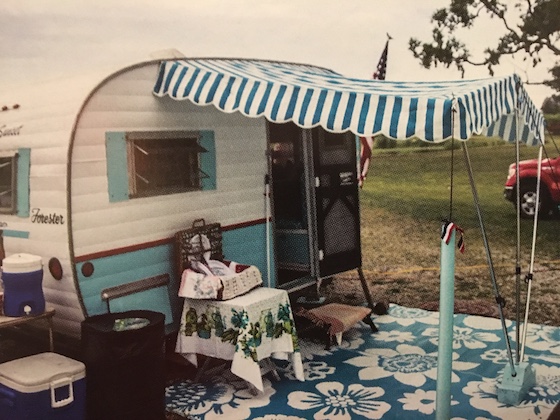RV customers want to be entertained. They are staying at your RV park to spend time with friends and family, to commune with nature, but also to do fun things. And the bigger your list of entertainment options, the longer they’ll stay with you – and the more likely they’ll come back. So what are some great venues you can create for your customers?
Pavilion
This is an excellent amenity for a number of reasons. It can be used virtually year-round, it offers protection from rain and sun, and it keeps the nature in. Any activity that your guests can dream of is appropriate for a pavilion. You can build these for as little as $10,000, and they are a major fixture at most RV parks. They also do not require a very large footprint of land and have no operating costs, besides sweeping and painting periodically.
Outdoor grills and fire pits
These are another amenity that cost very little but have huge bang for the buck. You can sit by the fire, make smores, roast hot dogs – outside fires are the very epicenter of most stories of great family experiences. You can build a professional-quality fire pit for $1,000 or so. Many RV parks have several of these.
Outdoor games
All you need to build exciting outdoor game venues is a mowed field and some basic equipment. The most popular of these are volleyball, horseshoes, basketball (which requires a paved or concrete court), and shuffleboard (also need a paved surface). None of these is too difficult to provide, and the return on investment is enormous in terms of happy customers.
Fishing lake
You either have this or you don’t, but if you have a body of water (or can create one by damming up a creek on your property) you should make full use of it. Clear a large expanse of the shore line for those who like walking up and looking at the water, as well as a pier for fishing. Install some benches for those who like to sit and reflect. Stock the water with fish to be caught. This is not a cheap amenity to add, but a big deal for many RV users.
Game room
You can create this feature – if you don’t already have an available area – by buying a pre-fab building or a double-wide mobile home, or building it with a concrete floor and a metal building. The top features for a game room are 1) pool table 2) foosball table 3) pinball machine(s) and 4) ping-pong. Only a pinball machine requires much maintenance, and you can buy these on the used market for under $1,000. They are terrific amenities that are fun for people of all ages.
Snack shop
Often part of the office or game room, this is an area in which guests can buy simple snacks such as chips, candy bars and soft drinks. In some RV parks, this feature is provided via vending machines, and in others it’s the RV park employee who sells them. Be sure to provide tables and chairs to eat on and some background music.
Swimming Pool
This is a landmark amenity, but is very expensive – more than everything else on this list combined both in initial cost and maintenance expense. Before you build a pool, ask yourself “how much of the year will this be used and how many kids really stay here?” If you RV park is in the north, it might only be warm enough to use it a few months of the year. However, if you are in south Texas, the swimming season might be 9 months. This is an amenity that is used about 80% by kids (or adults who kids drag along) and if your normal customers are just adults, it’s unlikely that it might get much use at all.
Splash pad
This is a new take on the concept of water recreation. It’s a paved surface that shoots water into the air, like a fountain, allowing people to get wet without jumping in a pool. It’s kind of like a water park without the pools. It’s also much cheaper to build (around $10,000) and to operate. It’s an effective alternative to a swimming pool that many people might actually like more.
Playground equipment
The rules regarding playground equipment have changed dramatically over the past decade. You will have to have cushioned “fall zones” under any equipment over a certain height. The most popular playground items are slides, swings and jungle-gyms. Commercial grade, they cost around $2,000 each, including the fall zone. They have very low maintenance costs.
Mini-golf
This is a great activity for all ages, but is very expensive to install unless you are handy and can do it yourself. A professional course can cost $10,000 per hole to build, but some RV park owners have built them for a fraction of that amount using their own staff and some creative thinking. All you are talking about it a concrete slab covered in astro-turf, after all. You can even theme the holes to local attractions.
Picnic area
All you need are some picnic tables (commercial grade ones cost around $1,000 and up) and a mowed area. While being among the least expensive amenity on this list, they are also one of the most used. If you do not have one of these, there is no excuse not to do so immediately.
Conclusion
The majority of RV park users are there for entertainment – bonding time with friends and family. They want activities that are fun and inclusive. The good news is that the very items they want are, for the most part, inexpensive and easy to maintain. Could you add some of these to your existing RV park?





